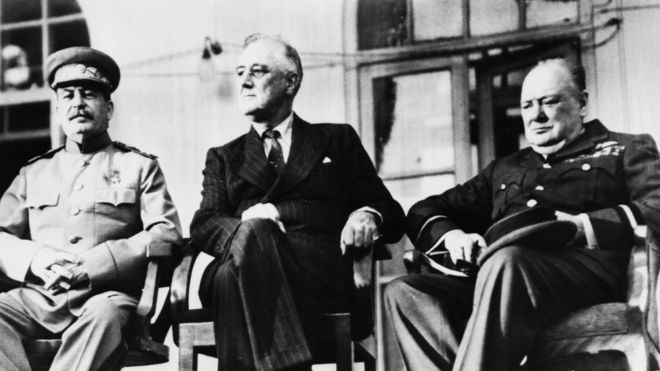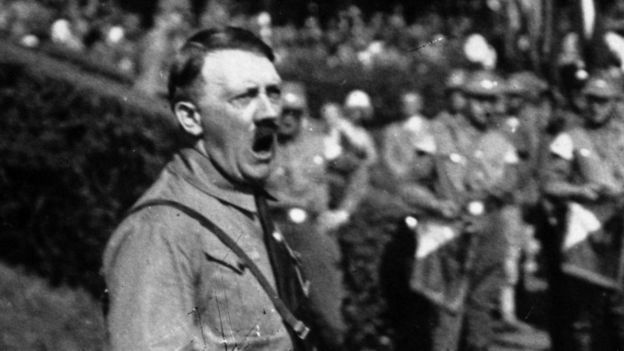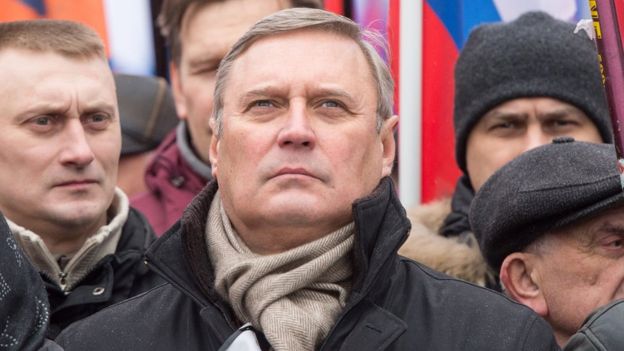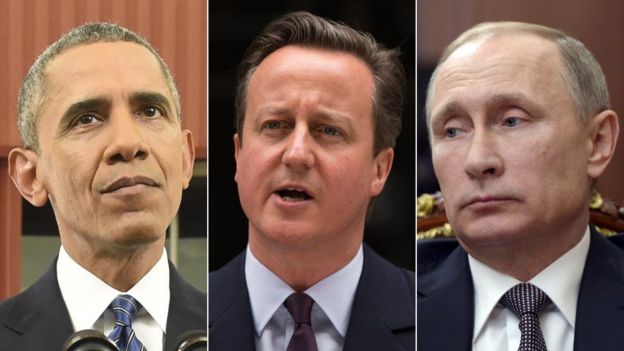'Invincible unity' (or the lack of it)
- 10 December 2015
- Europe
 Getty Images
Getty Images
The year is 1943. The place is Tehran. The leaders of Britain, America and the Soviet Union are meeting to co-ordinate their final push against Hitler.
On newsreel footage of the event, to an accompaniment of rousing military music, an excited narrator declares: "Roosevelt, Churchill and Stalin have set the ball rolling for the grand finale: Britain, America and Russia are bound together in invincible unity!"
More than 70 years have passed since the Tehran Conference. But today, in Russia, the idea of "invincible unity" is being revived and repackaged for a new war: the war on terror.
"We understand that international terrorism is an international phenomenon and to combat it we need an international coalition," Metropolitan Hilarion of Volokolamsk, head of external church relations for the Russian Orthodox Church, tells me.
"During the Second World War, on the one side, there were countries which were very different as far as their political systems were concerned. And yet they were able to put aside these differences in order to combat the plague of fascism. What we need now is the same: to put aside the differences to combat together international terrorism."
 Hulton Archive
Hulton ArchiveTehran Conference
- 28 November to 1 December 1943
- the first meeting of the Big Three Allied leaders: British Prime Minister Winston Churchill, US President Franklin D Roosevelt and Russian leader Josef Stalin
- aim was to discuss future strategy - and more specifically, the invasion of France (now codenamed Operation Overlord)
- the Normandy landings were confirmed, and, shortly after the conference, Gen Eisenhower and Gen Montgomery were appointed as commanders
- Stalin also confirmed the Soviet Union would join the war against Japan
- The post-War division of Germany was also discussed
Ulterior motive?
In recent weeks, so many of the Russian politicians, officials and religious figures with whom I've spoken have promoted the same message: that Russia and the West should forge a World War Two-style alliance against so-called Islamic State.
President Putin has put forward the same idea. Speaking at the United Nations in September, he called for a "genuinely broad alliance against terrorism, just like the one against Hitler".
 AFP
AFP
But Mr Putin's former Prime Minister, Mikhail Kasyanov, suspects the Kremlin has an ulterior motive for seeking "invincible unity".
"Mr Putin desperately wants co-operation with the West," Mr Kasyanov says. "First, in terms of lifting sanctions. Secondly, to recognise that without Russia nothing in this world could happen. External respect would be a source of respect inside Russia. He needs this to transfer through propaganda, through television, to the Russian people."
The Kremlin, though, is not prepared to secure invincible unity at any price. And certainly not if that price was Russia having to end its support for President Assad.
The United States, Britain and France may view the Syrian leader as an obstacle to peace, but as long as he stays in power in Damascus, Russia can expect to retain influence there.
'No common vision'
Such divergent views complicate efforts for a grand anti-terror coalition.
"We have no common vision. Since we don't have a common vision, we cannot have a common strategy," says Andrei Kortunov, from the Russian International Affairs Council.
"What's more, most of the sides engaged in this conflict do not have trust in each other, which is a major complication. Given the concentration of troops in the region, the sheer military power generates risks. I don't see an end game. Neither in Washington or Moscow or London, for how we're going to end this whole thing."
 Getty/Getty/AP
Getty/Getty/AP
The recent shooting down of a Russian bomber by Turkey - a Nato member - has dealt a further blow to invincible unity, increasing Russia's suspicion of the West. Even those Russian politicians who tell you they want a broad coalition leave you doubting they really believe it is possible.
"The problem is that certain countries, the United States included, probably the United Kingdom included, try to use this unstable situation in order to promote certain national interests," Konstantin Kosachev, head of the foreign affairs committee in Russia's upper house of parliament, tells me.
"The interests they promote are the interests of staying as the leading nations, the interests of ruling mankind and preserving the right to determine who is right and who is wrong, who is to stay in power, who is to be deleted in power. This is completely wrong I believe."
Nevertheless, I cannot help thinking that if Roosevelt and Churchill could find a way to work with Stalin, Obama and Cameron can find a way to work with Putin.
Perhaps this will only happen, though, when all sides conclude the threat to their nation is so great and imminent that the only way to win the war on terror is to fight together.
Listen to Steve Rosenberg's report on Today on BBC Radio 4 on Thursday, 10 December.
No comments:
Post a Comment